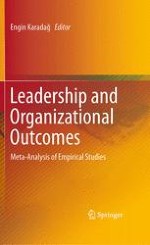2015 | OriginalPaper | Chapter
The Effect of Leadership on Organizational Climate
Authors : Sabiha İşçi, Esra Çakmak, Engin Karadağ
Published in: Leadership and Organizational Outcomes
Publisher: Springer International Publishing
Activate our intelligent search to find suitable subject content or patents.
Select sections of text to find matching patents with Artificial Intelligence. powered by
Select sections of text to find additional relevant content using AI-assisted search. powered by
